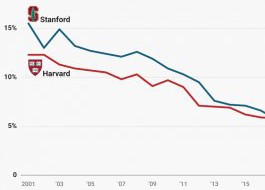
High-school students all over the country are putting the finishing touches on their college applications.
Chances are, they all want to know the secret to increasing their chances of gaining acceptance into college. The answer is actually quite simple: go to the same school as one of your parents.
While legacy status — the term used to indicate a family member attended the same school — has been recognized anecdotally as providing a benefit to college applicants, education startup AdmitSee has used data it collects to definitively prove this correlation.
Admitsee is a platform that has 60,000 profiles of students who have been accepted into college. In addition to admissions essays, and test scores, the students list other data points for prospective students to browse.
The company analyzed the profiles of students who indicated their legacy status, and found that legacy students scored lower on the SAT than nonlegacy students.
Of the 3,478 profiles which responded to the legacy question, legacy profiles scored 1870 on the SAT versus 1943 for nonlegacy students.
The trend remained for students who were accepted into top 25 schools (as ranked by the US News & World Report), where legacy students scored 2133 versus 2156 for nonlegacy students.
Preferential treatment for legacy students has been studied before. Michael Hurwitz, a Harvard doctoral student, conducted a study at 30 highly selective colleges and found that legacy students had seven times the odds of admissions as nonlegacy students.
But the issue of awarding an advantage to legacy students remains a contentious issue, especially in the face of push back over affirmative action policies in college admissions.
"It's fundamentally unfair because it's a preference that advantages the already advantaged," Richard D. Kahlenberg, a senior fellow at the Century Foundation, told The New York Times in 2011. "It has nothing to do with the individual merit of the applicant."




